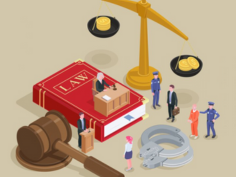What you’ll acquire:
- Acquire an in-depth understanding of core modules pertaining to legal frameworks and standards.
- Grasp the foundational and advanced principles of the Criminal Procedure Code.
- Enhance analytical skills to dissect complex legal issues and formulate cohesive arguments through the application of legal theories and doctrines.
- Prepare comprehensively for the bar exam or other legal examinations through a well-structured curriculum and focused study materials.
Ready for law? Here's what you need!
- Fundamental knowledge of jurisprudence concepts
- A proactive attitude toward understanding legal frameworks
- Competency in critical analysis and reasoning
- Proficiency in verbal and written communication
- A keen interest in societal structures and norms
- Commitment to ethical practices and integrity in the field of law
Description:
Greetings! Everyone, I am honoured to be your guide on this enlightening journey through the complexities of the law. This course has been meticulously designed to provide an in-depth understanding and mastery of various branches of law, offering valuable insights and materials to accelerate your learning curve.
Who can benefit from this course?
Whether you're an aspiring legal professional embarking on your LLB journey, gearing up for your exams, or an enthusiast keen to unravel the world of law, the Criminal Procedure Code caters to a wide spectrum of learners. We cover a well-rounded curriculum that encapsulates both traditional and contemporary branches of law, designed to give you a holistic perspective.
Comprehensive curriculum featuring: Criminal Procedure Code
Origin of the Juvenile Justice Act and Pre-Trial Process Arrest: The Juvenile Justice Act was enacted with the objective of addressing the distinct needs and vulnerabilities of young offenders. Its origins can be traced back to the growing recognition of the unique circumstances surrounding juvenile delinquency. The Act outlines procedures for the arrest and pre-trial processes for juveniles, emphasizing the importance of treating them with sensitivity and rehabilitation in mind. Pre-trial arrests of juveniles are guided by specific protocols designed to protect their rights and ensure that they are treated differently from adult offenders.
Preparatory Process of Search, FIR, and Cognizance Trial Process: The preparatory process in the criminal justice system involves crucial steps like conducting searches, filing First Information Reports (FIRs), and taking cognizance of offenses. Searches are carried out to gather evidence, while FIRs initiate the legal process by reporting an alleged crime. The court takes cognizance, signalling the start of the trial process. These preparatory stages lay the foundation for a fair and just trial, ensuring that evidence is properly collected, documented, and presented before the court.
The need for a fair trial and change: The need for a fair trial is paramount in any legal system, as it upholds the principles of justice, equity, and human rights. Fair trials ensure that the accused are provided with due process, legal representation, and the opportunity to present their defense. Furthermore, the legal system must adapt to societal changes and evolving norms, necessitating periodic updates and reforms. This ensures that the justice system remains effective, transparent, and accountable, aligning with the evolving needs of society.
Process under Court Provisions: The process under court provisions encompasses the various stages and procedures within the judicial system. It includes filing cases, hearings, evidence presentations, legal arguments, and judgments. Court provisions guide how disputes and criminal matters are resolved, ensuring that justice is administered impartially and in accordance with established legal principles and procedures.
Juvenile and Probation Delinquency: Juvenile delinquency refers to the involvement of minors in unlawful activities. Recognizing the potential for rehabilitation, many legal systems incorporate probation as a key component in dealing with juvenile delinquents. Probation offers a chance for these young offenders to reform and reintegrate into society without serving a full prison sentence. It involves supervised rehabilitation programs and community-based support to address the underlying causes of delinquency and prevent future criminal behaviour.
Exclusive Resources and Materials:
Interactive Video Lectures: Engage in dynamic video lectures that facilitate a deeper understanding of the Criminal Procedure Code.
Subject-Specific Assignments: Hone your analytical and critical thinking skills with assignments tailored to the Criminal Procedure Code.
Multiple Choice Questions (MCQs): Test your knowledge through a series of MCQs designed to reinforce your understanding of the Criminal Procedure Code.
Short Q&A Sessions: Participate in brief Q&A sessions to clarify doubts and foster the Criminal Procedure Code.
Comprehensive Study Material: Gain access to an extensive collection of study materials that support your learning journey at every step of the Criminal Procedure Code.
Your Gateway to Legal Mastery:
The Criminal Procedure Code aims to be your one-stop destination for legal expertise, offering a robust set of tools and resources that I used to excel in my LL.B. program. It serves as an excellent precursor for those venturing into their degrees and a refresher for those gearing up for their exams.
Join us in this legal endeavor:
Thank you for considering the Criminal Procedure Code as a step towards achieving your educational aspirations in the field of law. We eagerly await the opportunity to facilitate your journey to becoming a legal aficionado.
See you on the course!






